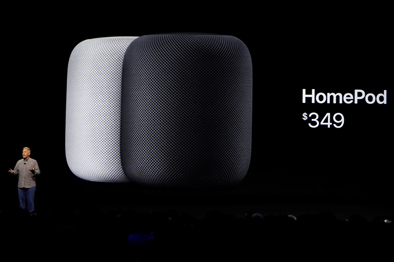OFweek smart home network news Apple, Google, Amazon and many other technology companies are trying their best to develop smart speakers, because smart speakers are becoming a hardware in addition to the hardware, but also in many other ways. Moreover, smart speakers are considered the control center of smart homes. ▲June 5, 2017, San Jose, California, USA, Phil Schiller, senior vice president of global marketing at Apple, introduced smart speakers at the launch event. (Xinhua News Agency photos) In today's fiery concept of artificial intelligence, smart speakers are seen as the entry point for smart home portals and home artificial intelligence interactions, triggering the rush of global technology companies. With the enthusiasm of major companies entering the market, the smart speaker market is changing from the Blue Ocean to the Red Sea. Voice Intelligence "Entry Battle" Recently, Apple released a built-in Siri smart speaker "HomePod", in the industry's view, Apple is joining voice intelligence "entrance battle." In the past few years, since Amazon launched its global Echo with its smart speaker products, the smart speaker field has brought together almost all international giants including Google, Apple, Microsoft, Samsung, and Sony. Not only has Echo cumulatively sold more than 10 million units, the industry has formed a consensus that voice interaction will become the mainstream paradigm of the next era. The “Internet Queen†Mary Mickle’s annual report on the Internet’s annual trends also highlights the future of intelligent voice interaction in two consecutive years. In China, Alibaba, Baidu, Jingdong, Xiaomi, and Lenovo's first-tier makers are wading into the smart speaker market. As early as 2015, Jingdong teamed up with HKUST to unveil its smart speakers, and so far sales have reached the order of one million units. Recently, the audio platform Himalayan FM also launched its smart speaker product "Xiaoya." Yu Jianjun, the CEO of Himalayan FM, said that this means that the giants of the domestic artificial intelligence field ushered in the first content player. According to market research firm Strategy Analytics, global smart speaker sales in 2017 could exceed tens of millions of units. In the next five years, its output value can reach a scale of nearly 10 billion US dollars. In this much-anticipated blue ocean market, major corporations have begun to deploy, trying to enter this area and the more imaginary space behind the smart home and home entertainment market. Expected to become a smart home control center The reason why many technology companies such as Apple, Google, and Amazon are trying their best to develop smart speakers is because smart speakers are becoming a platform for making money besides hardware. Moreover, smart speakers are considered to be the control center of smart homes. In addition, smart speakers invested by tech giants such as Amazon and Apple are also laying the foundation for the future of voice processing technology. Liu Xingliang, dean of the DCCI Internet Research Institute, said: “Voice is the best and most convenient form of human-computer interaction in the future, and smart speakers are the best entrance.†According to a report released by the Research Department of CICC, smart speakers have already entered the mass market from niche circles of early users. This is not only due to the advantages of voice recognition technology, but more and more third-party applications make it possible to bring practical value to ordinary families. Intense domestic competition but no "explosive goods" At present, the competition in the domestic smart speaker market is heating up. According to Li Haibo, general manager and vice president of Himalayan hardware, he has seen no fewer than a hundred smart speakers, and within one kilometer of Shenzhen Nanshan District alone, there are hundreds of smart speaker companies that provide hardware or technical solutions. Although the current domestic smart speaker market has been mixed, but in the eyes of the industry, and Amazon, Google, Apple, Microsoft, etc., compared to smart speakers in the domestic market was slightly tepid, and did not produce too much burst Products. The reasons may mainly include several aspects: Chinese speech recognition and semantic interaction and dialogue interaction technology are far from mature, and the interactive experience provided by the device is far from the truly barrier-free human-computer interaction, affecting the user experience; the core of the smart speaker "Value" is not standardized. Users do not know whether to pay for good sound quality or pay for smart money. "Intelligent sound box as the entry point for family artificial intelligence interaction, and impress users is the top priority." Some experts pointed out that in the future, smart speakers will carry the functions of personal assistants in home situations. It may be tailored, customized, and personalized. product. Smart speakers need to make good products in the country and sell them. It is related to many factors such as product experience, content, technology, ecology and so on. Not only does it need to be polished on the product side and interaction stage, but also it needs to optimize the service content itself. Cat 6 Lan Cable,Cat6 Ethernet Cable,Outdoor Cat6 Cable,Lan Cable Cat6 Zhejiang Wanma Tianyi Communication Wire & Cable Co., Ltd. , https://www.zjwmty.com